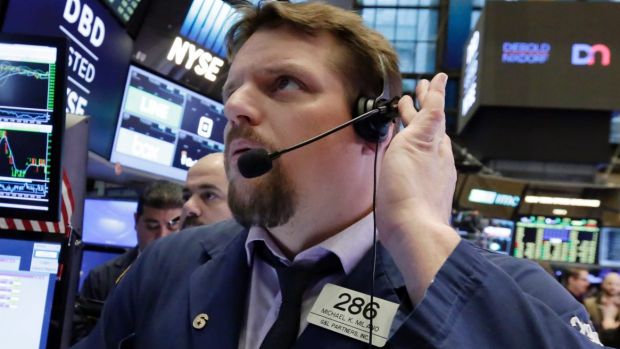The Dow Jones Industrial Average climbed past 20,000 for the first time as stocks around the world extended a rally after corporate earnings reignited investors' optimism in economic growth. Bonds sold off with oil.
The index for American blue chips took the round-number milestone after a handful of rallies fell short in the past month. It was the second-fastest 1000-point trip in its history. European equities jumped the most since November 9, swept up in trades favouring banks and cyclical companies.

The yield on 10-year Treasury notes topped 2.50 per cent. The Mexican peso slumped after Donald Trump said he plans to unveil actions that include steps toward building a border wall. Oil fell on increased US stockpiles. Copper touched a two-month high before finishing flat. Aluminium, zinc and nickel closed lower. Spot iron ore dipped.
ASX futures rose 39 points or 0.7 per cent to 5650. Australian markets are closed Thursday for the Australia Day holiday. On Wednesday, the benchmark S&P;/ASX 200 index ended 0.4 per cent higher at 5671, propped up by a 2 per cent surge in the materials sub-index. In New York trade, shares of BHP Billiton rose 0.3 per cent, Rio Tinto added 0.6 per cent.
The Australian dollar slipped 0.1 per cent to US75.69¢, down from an overnight peak of 75.99. Australia's 10-year government note yield was last at 2.73 per cent.
"With a swift move towards signing executive orders, coupled with underlying positive economic data, clarity has begun to hit the headlines, and all the US indexes are celebrating," Quincy Krosby, market strategist at Prudential Financial said. "Clarity is the markets' oxygen."
The stock surge comes as Trump moves to fulfil pro-growth campaign promises, including identifying possible infrastructure projects, approval of two oil pipelines and cajoling of American car makers to build plants in the US. Corporate earnings added to the bullish sentiment, with Boeing the latest company to post results that topped expectations.
Other global-growth signals such as rising bond yields are feeding higher bank lending margins, and re-invigorated spending is boosting consumer cyclicals.
Here are the main moves in markets:
Stocks
The Dow rose 155.12 points or 0.8 per cent to 20,067.83 at 4pm in New York, the first close above the round number. It's up 9.5 per cent since Trump's election.
Boeing led gains in the index, rising 4.2 per cent to an all-time high after reporting a profit. Nasdaq added 1 per cent.
The S&P; 500 Index jumped 0.7 per cent to a record 2295.95. Industrial, technology and financial shares led gains.
The Stoxx Europe 600 Index jumped 1.3 per cent, while Germany's DAX rose 1.8 per cent, to the highest level since May. In London, the FTSE 100 gained 0.2 per cent. France's CAC 40 was up 1 per cent.
Germany calls bankers to Frankfurt: German regulators will meet with representatives more than 20 foreign banks on Monday in preparation of a post Brexit world.
Personal computer maker Logitech International led Europe's stock gains after beating quarterly profit estimates, surging 16 per cent. Banco Santander rose 3.4 per cent on better-than-expected quarterly profits.
Bonds
The yield on the 10-year Treasury added five basis points to 2.52 per cent, the highest level of the year.
Yields reached session highs after a $US34 billion 5-year note auction stopped at 1.988 per cent, about 1.2 basis points above where the note was quoted in when-issued trading at the 1pm New York time bidding deadline.
The yield on the benchmark Bund due in a decade rose six basis points to 0.46 per cent, the highest level in a year.
Currencies
The greenback weakened against all its Group of 10 peers except the Australian dollar, as the Bloomberg Dollar Spot Index resumed its slide. It fell 0.3 per cent and is poised for a fifth straight weekly decline.
Losses were steepest against the Canadian dollar and the British pound.
UBS says US dollar to 'roll over': The dollar has peaked and will probably decline this year under President Donald Trump.
The positive correlation between the US dollar and Treasury yields, which touched 93 per cent on November 1, the highest in three years, has now declined to less than 54 per cent. That in turn has helped spur gains in high-yielding, commodity currencies like the Australian and New Zealand dollars.
The Mexican peso gained more than 1 per cent even as Trump took action to advance a border wall.
Commodities
BHP strike fears fuel copper: Copper hits two-month high, before retreating to end flat. Most other metals eased ahead of Lunar New Year.
Iron-ore futures increased 1 per cent to near the highest level in more than two years. Speculation of sustained Chinese demand for imports is outweighing repeated warnings from analysts that the rally is overextended and will unravel. Spot iron ore dipped 20 US cents to $US82.49 a tonne.
The Bloomberg commodity index, which measures returns on raw materials, fell 0.4 per cent.
Gold futures tumbled 1 per cent to $US1201.90, for a second day of declines as optimism around corporate earnings fuelled risk appetite.
West Texas Intermediate crude lost 0.8 per cent to drop below $US53 a barrel. It settled at $US52.75 a barrel after a US government report showed crude and fuel inventories increased.
OPEC and other oil producers are likely to comply fully with a deal to reduce supply, bringing global crude markets into balance early this year, Kuwaiti Oil Minister Essam Al-Marzouk said